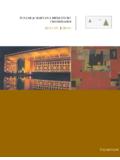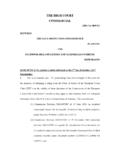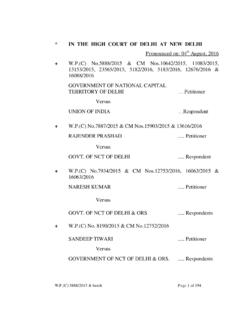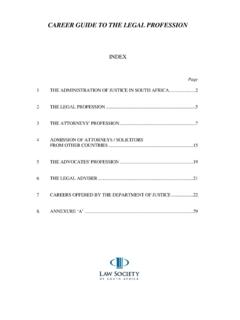Transcription of THE SUPREME COURT OF APPEAL OF SOUTH …
1 THE SUPREME COURT OF APPEAL OF SOUTH africa . JUDGMENT. Case No: 70/12. Not reportable In the matter between: CHAUKE HLAYISANI RONNY FIRST APPELLANT. NHLEKO LUNGELO JACKSON SECOND APPELLANT. and THE STATE RESPONDENT. Neutral citation: Hlayisani Chauke v The State (70/12) [2012] ZASCA 143. (28 September 2012). Coram: Navsa, Malan, Bosielo, Tshiqi and Petse JJA. Heard: 17 September 2012. Delivered: 28 September 2012. Summary: Criminal law murder liability no admissible evidence placing accused at the scene of crime no basis upon which accused could be convicted.
2 Extra-curial statement admissibility when contested must be established by trial-within-a-trial. 2. _____. ORDER. _____. On APPEAL from: Limpopo High COURT , Thohoyandou (Hetisani J sitting as COURT of first instance): The APPEAL of both appellants is upheld and their convictions and the sentences are set aside. _____. JUDGMENT. _____. PETSE JA (Navsa, Malan, Bosielo and Tshiqi JJA concurring): [1] The appellants were indicted before Hetisani J in the Limpopo High COURT , Thohoyandou on a charge of murder of a taxi-owner, Mr Mihloti Foster Mukhari.
3 They were both convicted as charged and subsequently sentenced to 27 years'. imprisonment. [2] On 28 November 2006, Hetisani J refused the appellants leave to APPEAL which was subsequently granted by this COURT on 22 July 2008 both against the convictions and the related sentences. [3] Before considering the merits of this APPEAL it is necessary to say something about some disturbing features of the case. First, it took almost five and a half years for the appellants to have their application for leave to APPEAL heard. This was in no way attributable to any fault on their part.
4 [4] It appears from the record that the appellants endeavoured, initially without legal assistance, to seek leave to APPEAL their convictions and sentences as early as 10 August 2001. Pursuant to letters written by the appellants to the Registrar of the High COURT , the latter referred the matter to an attorney, who had represented them at the trial, with a request that he prosecute their applications for leave to APPEAL . 3. [5] In 2003, disgruntled at the lack of progress, the appellants solicited the assistance of the Inspecting Judge of Prisons who advised them that their complaint fell outside of the mandate of his office.
5 The appellants then resorted to communicating with the Minister of Justice, whose administrative officer acknowledged receipt of the letter on behalf of the minister and further indicated that the matter had been referred to the Registrar of the High COURT for urgent attention. There was no response from the registrar. The absence of a response by the registrar prompted a reminder on 10 February 2004 in which the registrar was again urged to report to the appellants on the current status of their APPEAL . This prompted the registrar to write to the second appellant on 22 April 2004 reporting that a response was still awaited from their erstwhile attorney.
6 [6] Nothing resulted from this correspondence. During 2005 letters went back and forth between the appellants, the registrar and the minister's office. Meanwhile, a new Minister of Justice took office and she too took up the appellants' cause with the registrar. Ultimately some headway was made when, on 28 November 2006, the appellants' application for leave to APPEAL was heard and refused by Hetisani J. [7] Following the refusal of the application for leave to APPEAL in the high COURT , the appellants approached this COURT for such leave which, as already mentioned in para 2 above, was granted on 22 July 2008.
7 Once leave to APPEAL had been granted, further delays in prosecuting the APPEAL occurred. It took a little more than four and a half years before this APPEAL was heard. When the record of APPEAL was eventually filed with this COURT it incorporated material which was entirely unnecessary and in breach of the rules of this COURT governing the preparation of records. In the result a period of some eleven years, a greater part of which the appellants have been incarcerated, has elapsed since the appellants' conviction. Thankfully, they had in the interim been released on bail.
8 [8] In general terms, an appellant ought rightly to take the necessary steps to ensure a full and complete record is lodged within the prescribed time-limits, to enable a proper APPEAL hearing. However, the circumstances of this case and the inexcusable lapse of time cannot be ignored. The appellants struggled for years to obtain a date for their application for leave to APPEAL to be heard in the high COURT . 4. For years, they struggled to engage the necessary institutions for assistance, including the minister and the Prosecuting Authority.
9 In these circumstances the State ought to have been of assistance, particularly since they were unrepresented for a lengthy period whilst they sought assistance in the prosecution of their APPEAL . [9] It goes without saying that the inordinate delays experienced in this matter are entirely unacceptable for obvious reasons. In terms of s 35(3)(o) of the Constitution, the appellants have a right to a fair trial which included the right of APPEAL or review to a higher COURT . Moreover, s 34 of the Constitution accords to everyone the right of access to a COURT .
10 Accordingly the delays of the extraordinary duration experienced in this case clearly undermine or compromise such rights in circumstances where there can be no justification therefor in an open and democratic society. [10] I now turn to the merits of the APPEAL . The prosecution of the appellants arose out of an incident which occurred on 1 November 2000 at Mukondeni, Limpopo. It was alleged that the appellants, acting in the furtherance of a common purpose, intentionally and unlawfully shot and killed the deceased. The State called several witnesses to support its case against the appellants.
















